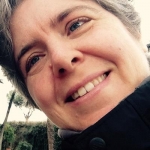'We have a boy!'
In May, AFP's deputy bureau chief in Rome Fanny Carrier spent a week aboard the Aquarius, one of a small armada of ships that are rescuing migrants all along the Libyan coast. This is the third and final part of her series on the voyage.
Aboard the Aquarius in the Mediterranean -- Again, I wake up with the sun. Angelina the midwife has been up for a while -- a woman eight months pregnant has had contractions during the night. On deck, the mood has changed sharply. After some sleep, the migrants are much cheerier. The children play, some couples snuggle. Most have put their white rescue jumpsuits on top of their clothes. Others have thrown out their clothes, many dirty from vomit, and have wrapped their blankets around their waists and the towels around their heads.
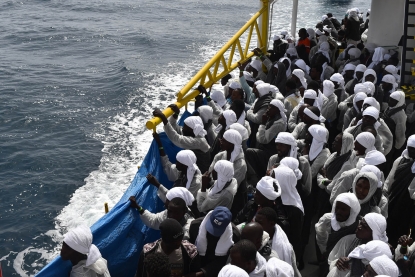 (AFP / Gabriel Bouys)
(AFP / Gabriel Bouys)Some stare out to the sea, fascinated. At one point, an island appears on the horizon. Several of them ask me “Is that it? Is that Italy?” Geography is not my strong point, so I have no idea what to say. Later, the captain will tell me its name, a name that we all know too well -- Lampedusa. This Italian island, the closest one to the African coast, had for a long time served as the migrant gateway to Europe, before a series of calamitous sinkings pushed rescuers to intercept the refugees further south.
For us journalists, this long sail to Sardinia is a gift -- we have all the time to talk to the migrants. Many of them want to talk, to tell their stories. They speak of violence and misery, of close encounters to escape this misery and the months and sometimes years that they spent trying to make a living in Libya.
You can never be sure that they are telling the whole truth. Like when Victoire, 35, six-months pregnant, tells me that her husband had to flee Cameroon after “accidentally” killing a neighbor who had raped their oldest child, a 13-year-old daughter. She tells me that she chose to go with him so that they “face the challenges together.” As I speak to her, her husband comes and tenderly kisses her. Are they really a loving, united couple or is it a man who made his pregnant wife follow him and leave their four kids, including the girl who was raped, behind because a father of a child born in Europe has a better chance of getting asylum than a man who is alone? Thankfully, it’s not for me to decide. But his testimony doesn’t appear in my story.
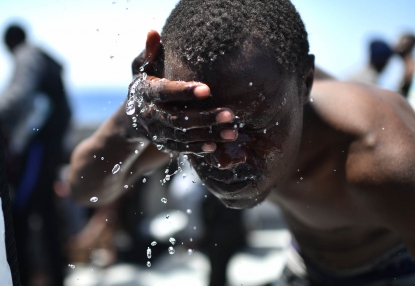 (AFP / Gabriel Bouys)
(AFP / Gabriel Bouys)There is one point on which all of the migrants agree -- the hell that is life in Libya. “There, we weren’t men.” “Libya is kidnappings, prison, kidnappings.” “They beat us every day, they beat our wives in front of us.” “They rape the women, sodomize the men, they kill for no reason.” “Even children carry arms and fire at black people.” “Are you writing about life in Libya? If I had known, I would have never left.” “Libya is a trip without a return. Once you enter Libya, you can never leave it normally. You have no choice but to end up at sea -- it’s either Europe or death.”
They assure me that they have only been witnesses to such violence. With the MSF they are more forthcoming. Erna, the Dutch doctor tells me once: “It’s one of those days when someone comes in for a cough and takes off their shirt and you see all the scars from the tortures they suffered and you realize they have broken bones, and they tell you these horrendous stories.”
“Do you have any idea what will happen to us now,” one young woman asks me.
Yes, I know exactly what’s going to happen to her, but I’m not going to tell her. Those who come from countries like Eritrea, Sudan, South Sudan or Somalia should easily get asylum in Italy, even though in general it’s not the country where they would like to stay. Others are going to have a harder time of it. Some will be asked to leave immediately. Some will wait for a year and a half or two for their papers before joining the ranks of migrants picking tomatoes or oranges for a meagerly wage. On reporting trips in Sicily and Rome I have met migrants at various points of this journey and it’s depressing to think that she is about to embark on it.
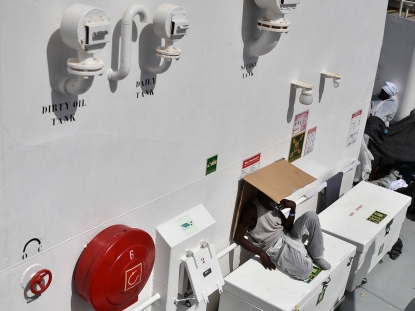 (AFP / Gabriel Bouys)
(AFP / Gabriel Bouys)In the late afternoon, I am finishing up my story for the day when Captain Alex runs onto the bridge, smiling and red from emotion. “We have a boy! I feel like I’m the father,” he exults.
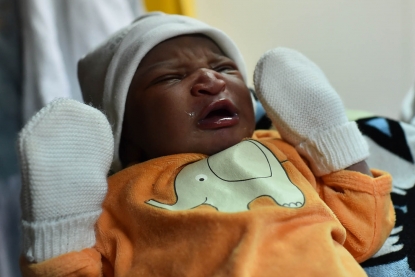 (AFP / Gabriel Bouys)
(AFP / Gabriel Bouys)A little while later, with the mother and the baby rested a bit, we are invited to take a photo of the parents and Destiny Alex, the baby’s name chosen in honor of the captain, who is bridling with joy. Then the father goes on deck to announce the news to the rest of the migrants. A round of warm applause breaks out. Even the Eritreans, Sudanese and Somalis, who sit at a distance and, speaking neither English nor French, need a bit of explaining as to what the commotion is all about, cheer the news.
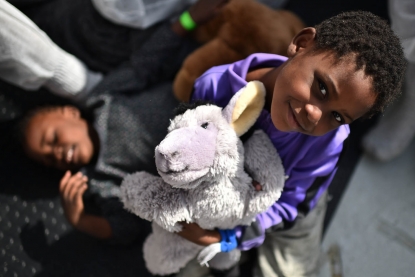 (AFP / Gabriel Bouys)
(AFP / Gabriel Bouys)This time, the good news comes in pairs -- Erna comes running, saying that she has just received an email saying that Zega, the little boy evacuated by helicopter the previous day, seems to be out of danger. Jens announces the news on the radio and it’s like the Aquarius is washed over by a wave relief and joy.
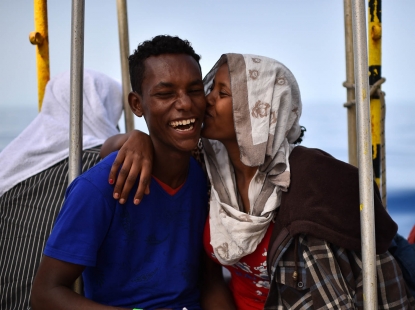 (AFP / Gabriel Bouys)
(AFP / Gabriel Bouys)In the evening, the captain asks me to come and translate for the parents of little Alex. The big Alex wants to give them 100 euros on the part of Aquarius’s parent company Kempel and SOS Mediterranee, as well as the baby’s birth certificate, with the exact location of his birth. Since the Aquarius is sailing under the Gibraltar flag, the little Alex was officially born on British soil. But unfortunately that won’t entitle him to citizenship -- one of his parents must be at least a resident for that to happen.
The mood is more somber in the mess hall. Several rescuers are watching the images taken by the Italian navy as a boat filled with migrants sinks. In a few days, they can be witness to the same thing and they know they are not ready for it. “The priority will be to distribute life jackets and wait for support before undertaking anything,” one of them tells me.
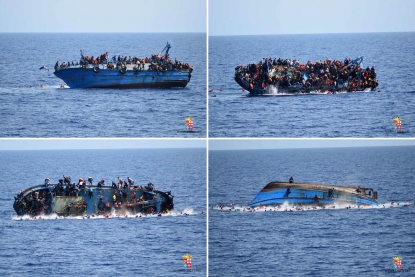 An overfilled migrant boat sinks off the Libyan coast on May 25, 2016, in photographs taken by the Italian navy who was involved in the rescue operation. (AFP / Marina Militare)
An overfilled migrant boat sinks off the Libyan coast on May 25, 2016, in photographs taken by the Italian navy who was involved in the rescue operation. (AFP / Marina Militare)A little while later, another rescuer comes down from deck, tired. Upstairs, the prospect of spending another night out of doors has soured moods and has done little to prevent arguments from breaking out. “It’s always like that. The first night goes by smoothly but from the second night on, it’s hard,” he says.
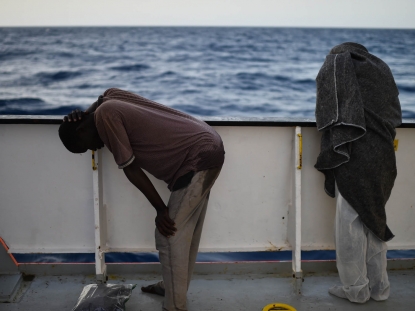 (AFP / Gabriel Bouys)
(AFP / Gabriel Bouys)The following morning, the coast of Sardinia appears in the distance. All eyes are locked onto this land that most of them have never heard of and of which some are wary. “Excuse me, can you tell me what to do to leave here,” asks me Turbine, the cousin of Zega’s mother, pointing to the picture of the island that I drew for her to try and explain where they are heading and where Zega and his mother are.
Sardinia is a region that welcomes the migrants, but it is very poor and so has little to offer them and often seems like a prison -- unlike Sicily, it’s not possible for them to leave here without authorization.
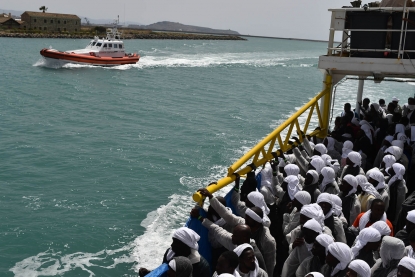 Arriving in Sardinia. (AFP / Gabriel Bouys)
Arriving in Sardinia. (AFP / Gabriel Bouys)As the boat approaches port, a party breaks out in the women’s room. They laugh, sing and dance, with each one taking their turn in the middle of a circle. Even me, which evokes laughter all around. I hesitate a bit, but then post on Twitter a few seconds of the video. As I suspect, my post sparks a torrent of reactions along the lines of “they’re celebrating getting (French) family subsidies.” It’s useless to try and explain to these people that the subject of subsidies has never come up throughout this trip, nor has the idea of coming to live in France, even if most speak the language.
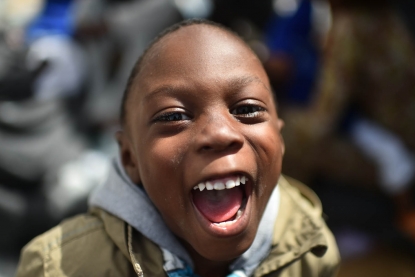 (AFP / Gabriel Bouys)
(AFP / Gabriel Bouys)On shore, the typical procedure awaits -- a photograph with a number when getting off the ship; a medical visit to see who may have head lice or scabies so they can be treated; a first identification interview; then a bus to a temporary shelter. All this can take hours, but the Red Cross has put benches in the shade, drinks, meals, toilets.
The sanitary protocol calls for all people who have been in direct contact with the migrants to put on a protection jumpsuit, gloves and a mask, in an effort to prevent the spread of any contagious diseases that they may have picked up. The migrants are also asked to wear a mask. Wearing a mask is common practice on military boats, where the migrants never see the faces of their rescuers. On the Aquarius, the MSF team limited itself to distributing bottles of disinfectant soap and isolating two Somalis showing symptoms of tuberculosis.
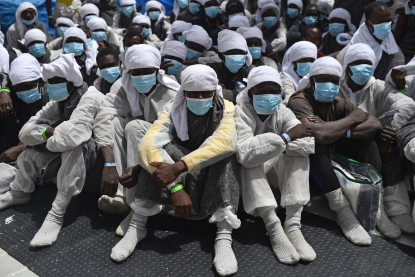 (AFP / Gabriel Bouys)
(AFP / Gabriel Bouys)Those two Somalis were the first ones to get off the Aquarius. Then the tiny Alex and his family, greeted by a bouquet of multi-colored balloons and the ooohs, ahhhs and applause of volunteers. Then it’s the women and the children. Some of the little ones have already made friends on board. Raoul in his pink T-shirt and Patricia with her huge eyes. Those two sneaked pencils from me when I wasn’t looking.. Daniel, with a big scar on his cheek, jumps into everyone arms. As he is carried along the deck toward solid ground, he sends air kisses to the entire crew.
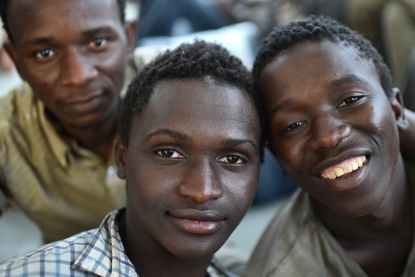 (AFP / Gabriel Bouys)
(AFP / Gabriel Bouys)These days, a similar scene is played out across the ports of Sicily and southern Italy. In the course of that week alone, more than 13,000 migrants were picked up at sea, a record. They were the lucky ones -- an estimated 880 people died during the same week trying to make the voyage, despite the fact that this huge rescue armada is now looking to prevent just that.
On deck, Ebenezer the Ghanaian pilot looks down at the scene smiling. “We take them on board, we drop them off, that’s the routine,” he says, trying (badly) to feign indifference. The previous day he was all emotion as he told me of one man that was picked up with an empty stare and another paralyzed with hypothermia and how relieved he was to see them both better.
Ed, the MSF logistics pointman, is at the end of an exhausting 48 hours during which he pulled the migrants, one by one, onto the ship, then organized their stay on board, from distributing meals to emptying the toilets. He knows that Europe is not going to roll out the red carpet for them. He particularly is enraged by the questionnaire that the migrants will have to fill out within the next few hours, which starts by a trick question “Do you want to work in Italy” and which at no point invokes an eventual request for asylum.
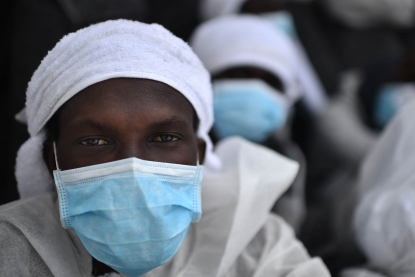 (AFP / Gabriel Bouys)
(AFP / Gabriel Bouys)Mary Jo is more optimistic. “These guys, what they’ve been through… they made it until here, Italy will be like a piece of cake for them.”
But there is no time for philosophizing. As soon as the last guest gets off, the crew teams clean up and an hour later Aquarius sets out again, for its next rendez-vous at sea.
This blog was translated from the French by Yana Dlugy in Paris. Read the original here. Click to read Part 1 and Part 2 of the series.
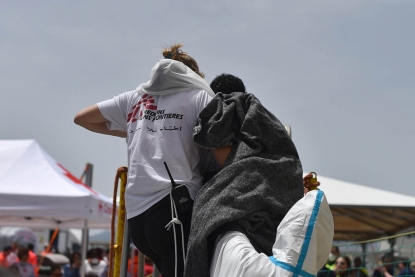 (AFP / Gabriel Bouys)
(AFP / Gabriel Bouys)


